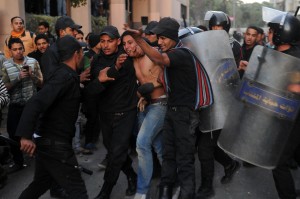
The “string of deaths” amongst detainees held in custody inside Matariya police station point to “torture and horrific detention conditions”, Amnesty International said in a statement on Wednesday.
At least nine detainees have died in Matariya police station since April 2014, three of which died last week alone. Amnesty International has described the investigations into their cases “half-hearted” since no one has been held accountable.
Furthermore, the state-backed National Council for Human Rights (NHCR) announced its “solidarity” in the cases of Shaimaa Al-Sabbagh and Matariya lawyer Kareem Hamdy in a statement released on Thursday.
The statement said the council is ready to respond to “civil calls” in the cases of Al-Sabbagh and Hamdy, “if their families request” the council’s solidarity.
Police birdshots killed Al-Sabbagh as a small protest was being dispersed by security forces in Talaat Harb on 24 January.
On the other hand, 28-year-old Hamdy was killed on 24 February after excessive torture at the Matariya police station during an interrogation by two national security officers.
Official forensic reports confirmed that Hamdy’s body bore torture marks, including broken ribs.
Egypt’s Public Prosecutor has opened an investigation into Hamdy’s case and ordered the detention of two national security officers, but a gag order has been imposed on the case’s developments.
“The pattern of deaths in custody emerging at Matariya Police Station is distressing,” said Hassiba Hadj Sahraoui, Deputy Middle East and North Africa Director at Amnesty International, adding that authorities “cannot continue to sweep rampant abuses under the carpet.”
When asked if the Ministry of Interior can respond to the Amnesty International claims, a spokesperson from the MOI’s media office told Daily News Egypt he “does not have enough information to respond.”
According to Sahraoui, “the authorities have announced investigations with the sole purpose of deflating criticism while at the same time shielding security forces from any criticism, let alone accountability.”
On 24 February, another detainee, Emad El-Attar, also died due to alleged negligence and poor ventilation in an overcrowded cell in the Matariya police station.
Security forces initially arrested El-Attar on 30 January “following a protest against military rule”, Amnesty International said.
He was then taken to the Matariya police station “where he was reportedly beaten and given electric shocks and was accused of belonging to a banned group, calling for protests and using violence against the police”. Meanwhile, his family and lawyers searched for him for seven days before they found him in the police station.
An anonymous eyewitness told the human rights watchdog that “on the day of his death [Emad] felt suffocated from the poor ventilation and excessive cigarette smoke in the cell. His fellow detainees banged on the door of the holding cell warning the security forces that Emad was very sick.”
According to the witness, police responded by saying: ‘When he is dead let us know and we’ll take him out’.”
A third detainee, 28-year-old Mostafa Mahmoud, is said to have died at the police station last week, allegedly after he had been held in a stress position for eight hours.
Amnesty International’s report went on to review the cases of three other detainees who have allegedly died of torture in the same police station.
According to a former detainee, not all deaths in the station are reported. At least 70 people will be crowded in poorly ventilated rooms, with some having to wear only their underwear.
According to the Egyptian Commission for Rights and Freedoms, at least 121 people have died in custody since 2014 due to deprivation of medical care and torture.
Cairo’s head of the forensic authority also stated there has been a rise in the number of deaths in police stations. While police stations are “not equipped to hold high numbers of detainees”, many who have been sentenced to one to years in prison remain in the police stations due to excessive overcrowding of prisons.
The detainees include both those held on criminal and political charges.
The Matariya neighbourhood has been a site of ongoing clashes between security forces and protesters residing in the area.

